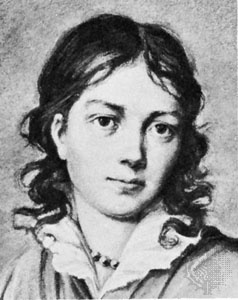Arnim, Bettina von
German writer
byname of Elisabeth Katharina Ludovica Magdalena von Arnim, née Brentano
born April 4, 1785, Frankfurt am Main 【Germany】
died Jan. 20, 1859, Berlin, Prussia
 one of the outstanding figures of German Romanticism, memorable not only for her books but also for the personality they reflect. All of her writings, whatever their ostensible themes, are essentially self-portraits.
one of the outstanding figures of German Romanticism, memorable not only for her books but also for the personality they reflect. All of her writings, whatever their ostensible themes, are essentially self-portraits.Von Arnim was unconventional to the point of eccentricity; wayward, yet a loyal wife (she married Achim von Arnim (Arnim, Achim von) in 1811) and a devoted mother to her seven children; susceptible and passionate, but jealous of her personal freedom; capable of enthusiastic devotion, yet absorbed in a cult of her own personality, which verged on narcissism. These paradoxes in her nature she projected into her books. Her three best-known works are rearranged and retouched records of her correspondence with Johann Wolfgang von Goethe (Goethe, Johann Wolfgang von) (Goethes Briefwechsel mit einem Kinde, 1835; “Goethe's Correspondence with a Child”), with Karoline von Günderode (Die Günderode, 1840), and with her brother Clemens Brentano (Brentano, Clemens) (Clemens Brentanos Frühlingskranz, 1844; “Clemens Brentano's Spring Garland”). The result of her editing is a peculiar blend of documentation and fiction, written in a brilliantly vivid, uninhibited style. Her mother, Maximiliane, née von La Roche, and Goethe had been friends before and after Maximiliane's marriage; this friendship ended abruptly when it aroused her husband's jealousy, and 35 years later her daughter took her place. Von Arnim idolized Goethe (who was 57 when she first met him); she had frequently visited Goethe's mother in Frankfurt and recorded tales of the poet's childhood. (Goethe later used her notes when he was writing his autobiography, Dichtung und Wahrheit.) She pursued Goethe with her attentions until 1811, when a public quarrel between her and Goethe's wife, Christiane, caused Goethe to disavow her.
Von Arnim stated her political views, which were sympathetic to the underprivileged, in two books written for the special benefit of the king of Prussia, Frederick William IV: Dies Buch gehört dem König (1843; “This Book Belongs to the King”) and Gespräche mit Dämonen (1852; “Conversations with Demons”). Von Arnim was also a gifted sculptor and musician. In the diversity of her talents and interests, she exhibited the universality that has been regarded as the hallmark of the German Romantic spirit.
- Takebe Katahiro
- Takeda Shingen
- Takefu
- Takeshita Noboru
- Takeuchi Seihō
- Takht-e Soleymān
- Devonshire, Spencer Compton Cavendish, 8th duke of, marquess of Hartington, earl of Devonshire, Baron Cavendish of Hardwick
- Devonshire, William Cavendish, 1st Duke of, Marquess Of Hartington, Earl Of Devonshire, Baron Cavendish Of Hardwick
- Devonshire, William Cavendish, 1st Earl of, Baron Cavendish Of Hardwick
- Devonshire, William Cavendish, 4th Duke of, Marquess Of Hartington, Earl Of Devonshire, Baron Cavendish Of Hardwick
- devotio moderna
- De Voto, Bernard
- Devrient, Eduard
- Devrient, Emil
- Devrient, Karl August
- Devrient, Ludwig
- Devrient, Max
- Devrient, Otto
- De Vries, Peter
- dew
- Dewantoro, Ki Hadjar
- Dewar, Sir James
- Dewas
- dewberry
- Dewey Decimal Classification